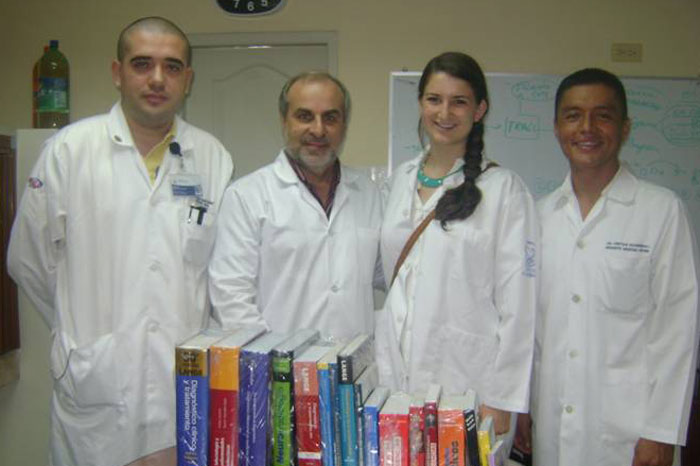
The Hospital Luis Vernaza, located in Guayaquil, Ecuador, is an 883-bed hospital that lacked round-the-clock medical references until University of Connecticut student Sarah Fuller stepped in.
Sarah raised $1,500 for books for a new hospital library that would make it possible for doctors to reference books of different specialties at all hours of the day or night.
To raise the money, Sarah volunteered at the UConn Health Center Emergency Department. She says the majority of her sponsors decided on an amount of money they would donate per volunteer hour, and then made the sum donation at the end.
“I believe these books are going to be a fantastic addition to the Hospital Luis Vernaza,” says Dr. Robert Fuller who is not only the medical director of the UConn Health Center Emergency Department, but also Sarah’s father. “It’s a huge hospital with lots of sick patients and there were no books for them to reference — I was shocked by that. There are things we take for granted here at home, such as the Internet available at our fingertips 24 hours a day.”
Sarah’s project started her senior year of high school for a class called “Global Problem Solving,” but her connection with Ecuador started her freshman year of high school when her family moved there for 10 months.
“My dad has done a lot of disaster work,” says Sarah. “We chose Ecuador because it is a medically underserved country, but also a relatively safe place for our family. It was amazing. The people were very friendly.”
Other than his work at the Hospital Luis Vernaza, Fuller provided medical assistance after the September 11, 2001 attacks and traveled to Haiti after the 2010 earthquake.
Sarah says her father was a role model in her desire to help others in the medical field.

(Photo provided by Sarah Fuller)
“He’s taught me that I can do it. He has always supported me, but I know that I have to be the one to do it. He’s taught me to be independent,” she says. One of the lessons she learned is the vital importance of the contacts that are made and kept.
“Without both local and international contacts, this never would have happened,” she says. “I really appreciated all the support for my project; I got a really great response.”
Her main contact in Ecuador was Dr. Cristian Guarderas, who discussed with Sarah what the hospital was lacking and what resources he thought would be most beneficial.
“Sarah is an example for college students,” says Guarderas. “She did all the hard work, which took a lot of her time. I helped her choose the medical books in Spanish that made her vision for our hospital a reality. Now that they are available to be read and studied, everyone will benefit from the better medicine.”
Currently, Sarah is a physiology and neurobiology major and is interested in pursuing medicine. She is a member of the UConn Storrs branch of the Global Brigades, which focuses on holistic approaches to problems in the world.
“It’s just cool to see your daughter put her efforts into something like this,” explains Fuller. “It sounds like a silly word to use, but it really is cool. It makes me happy and proud to watch Sarah achieve her goals. What’s important to her is not what she looks like, the clothes she’s wearing, or the car she’s driving — it’s about something bigger than that.”
Follow the UConn Health Center on Facebook, Twitter and YouTube.



